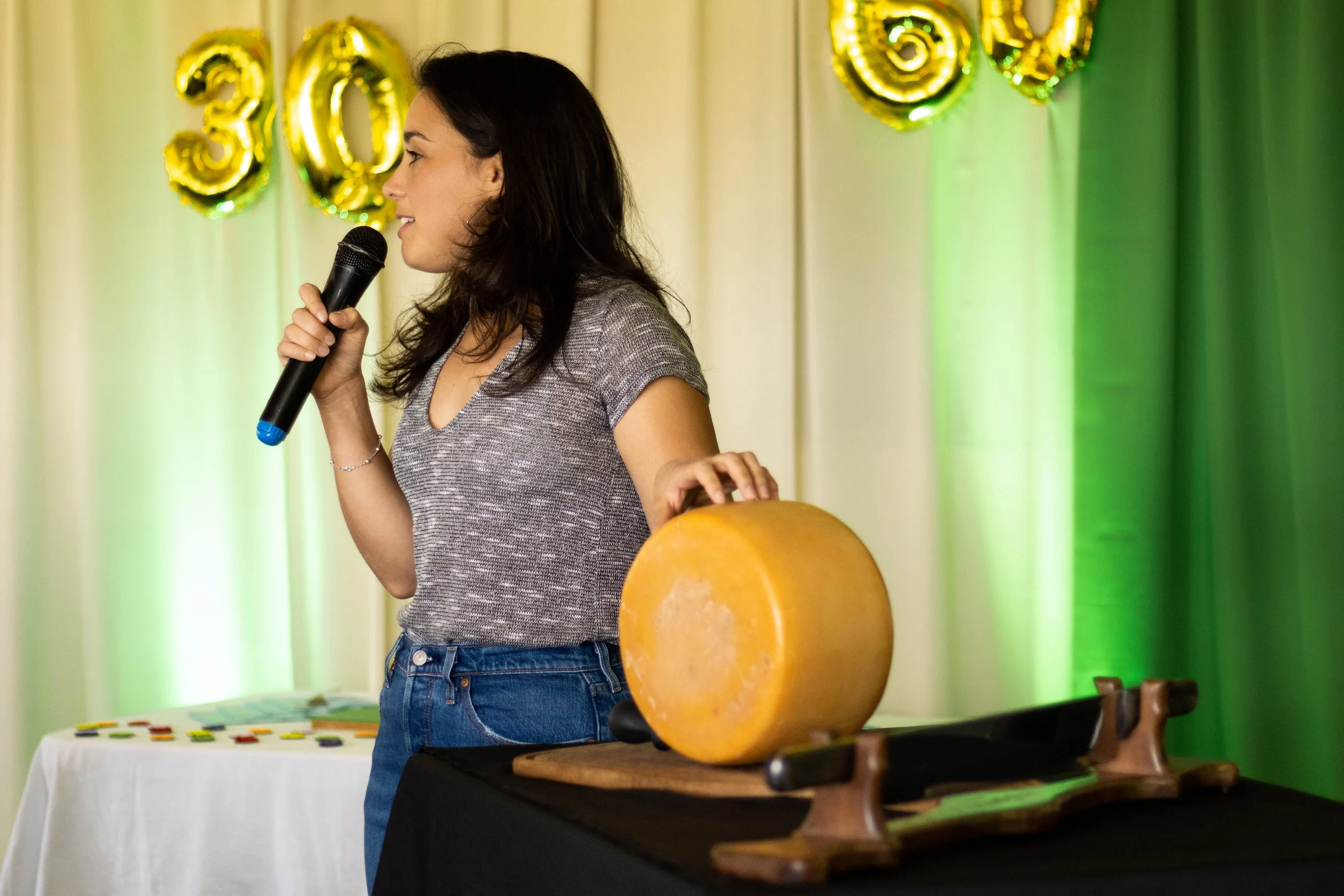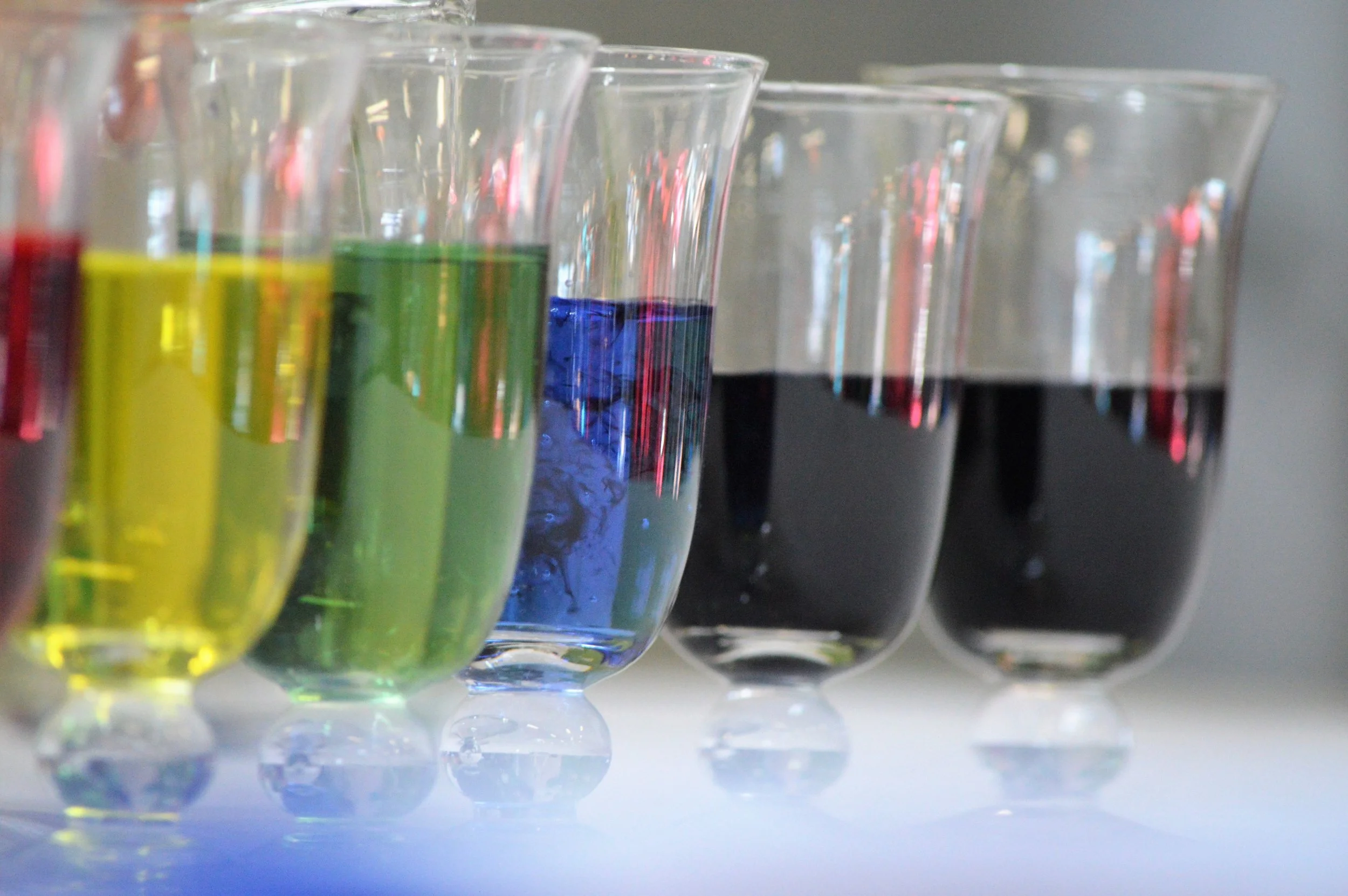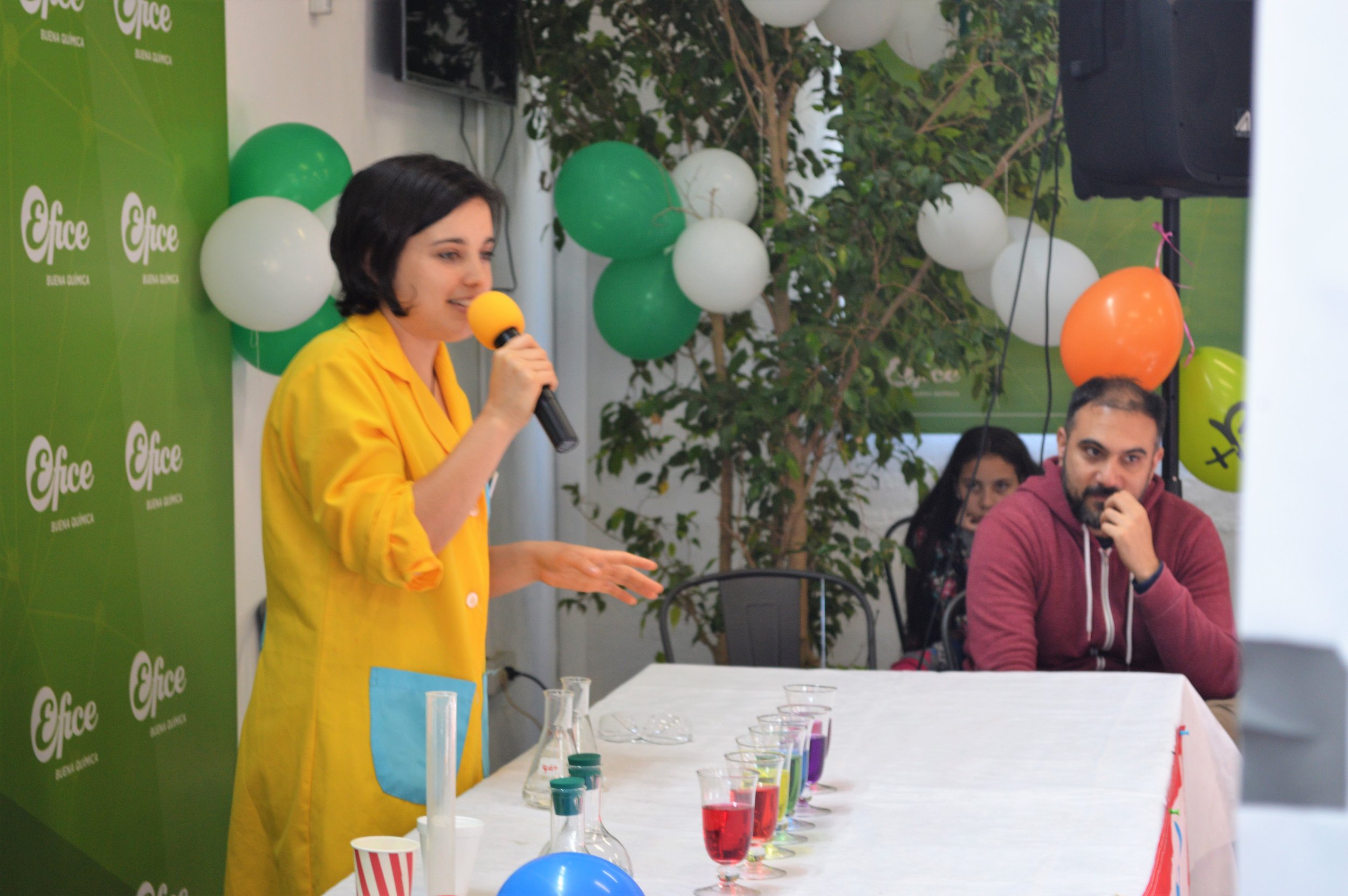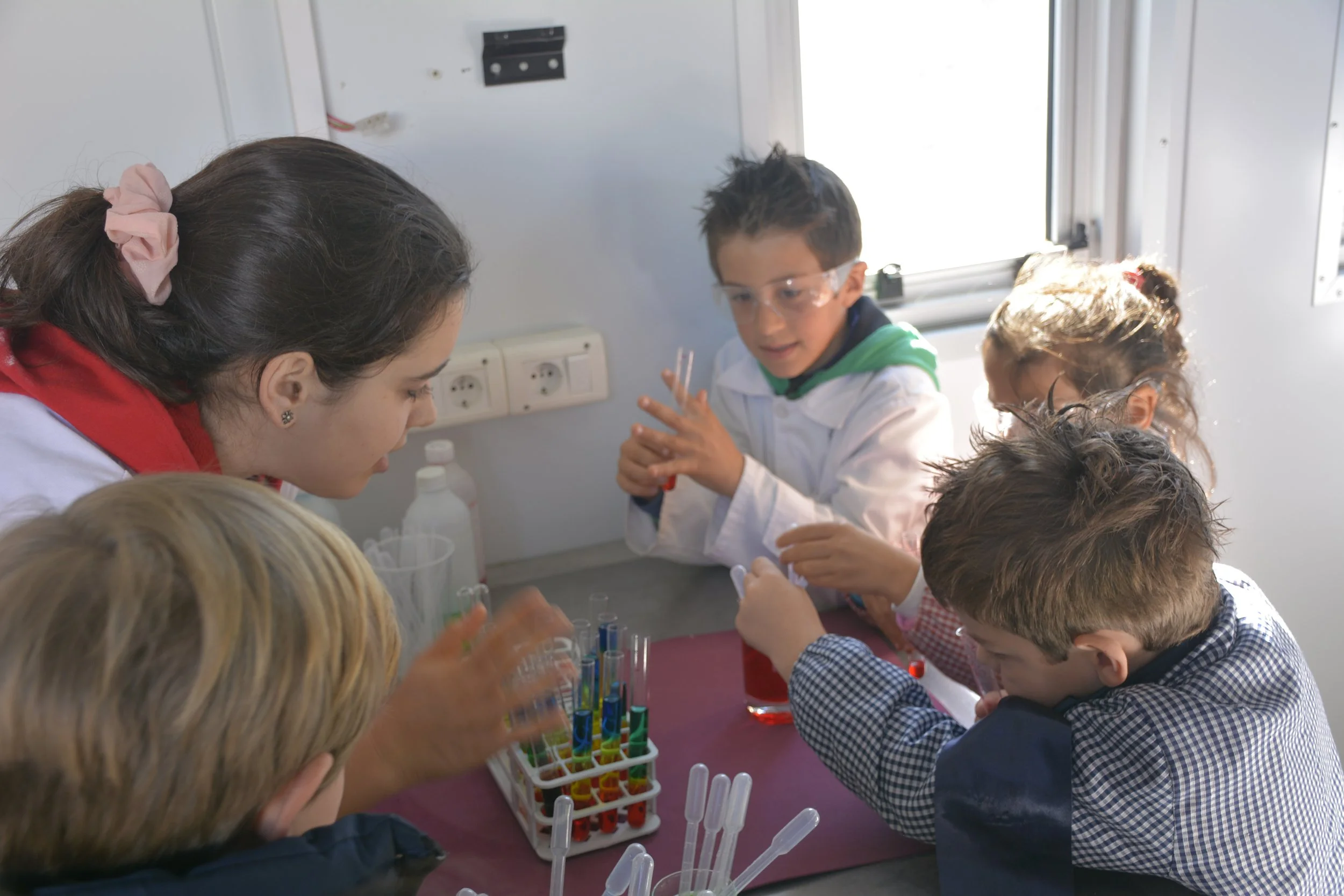Comencé en la comunicación científica en 2011, cuando me sumé al programa Química d+, un espacio maravilloso de extensión y comunicación de la Facultad de Química (Uruguay), donde participé durante diez años (aunque dicen que de ahí nunca te vas del todo).
En 2015 cofundé Bardo Científico, un grupo de científicos y científicas que usamos herramientas de humor, stand-up y de teatro para contar la ciencia. Con Bardo hemos realizado presentaciones, talleres, y capacitaciones para ayudar a otros investigadores a compartir su trabajo con el público de manera creativa y cercana.
En 2016, gracias al apoyo del BID, lideré junto a Bardo Científico la organización del primer concurso y festival sudamericano de monólogos científicos, una iniciativa que nació tras participar en un hackathon de comunicación en Punta Arenas (Chile), donde tuve que defender mi idea en solo un minuto.
Actualmente creo contenido de comunicación científica, en mi página de Instagram va_conciencia. Además, presento regularmente mi trabajo de investigación en congresos científicos, y también en espacios educativos y comunitarios como escuelas rurales, clubes de apicultores y ferias, convencida de que la ciencia se enriquece cuando circula, se comparte y se conecta con quienes la viven desde otros lugares.
No puedo dejar de mencionar que nací y crecí en una familia quesera, así que la quesería artesanal a veces se mezcla en mis historias. Como ya dije, me encanta contar, y también cuento las historias de los más exquisitos quesos artesanales. Me encargo del marketing y las redes sociales de Rostán Quesos Artesanales, un emprendimiento familiar que pone en valor la tradición quesera artesanal, cuidando cada detalle del proceso para ofrecer productos de calidad.
My sciece communication journey started in 2011, when I joined Química d+, a wonderful outreach and communication program at the Chemistry School (Uruguay), where I was involved for ten years (though it’s said you never truly leave).
In 2015, I co-founded Bardo Científico, a group of scientists who use humor, stand-up comedy, and theater to tell science stories. With Bardo, we’ve held performances, workshops, and training sessions to help other researchers share their work in creative and engaging ways.
In 2016, with the support of the Inter-American Development Bank (BID), I led—together with Bardo Científico—the organization of the first South American contest and festival of science monologues, an initiative that was born after participating in a science communication hackathon in Punta Arenas, Chile, where I had to pitch my idea in just one minute.
Currently, I create science communication content on my Instagram account va_conciencia. I also regularly present my research at scientific conferences, as well as in educational and community spaces such as rural schools, beekeeping clubs, and local fairs—driven by the belief that science grows stronger when it circulates, is shared, and connects with those who live it from different perspectives.
I also have to mention that I was born and raised in a dairy farm, so artisanal cheese often finds its way into my stories. As I said, I love storytelling—and that includes telling the stories behind the most exquisite artisanal cheeses. I’m in charge of marketing and social media for Rostán Quesos Artesanales, our family business that honors traditional cheesemaking by carefully tending to every detail of the process to offer high-quality products.
va_conciencia
En mi página de Instagram comparto mi experiencia como investigadora, mostrando los avances de mis proyectos, los métodos que utilizo y las reflexiones sobre los retos y descubrimientos que me encuentro en el camino. Me gusta mostrar todas las partes del proceso, incluso las frustraciones, que nos hacen y forman como científicos y científicas.
Visitá @va_conciencia
On my Instagram account, I share my experience as a researcher, showcasing the progress of my projects, the methods I use, and reflections on the challenges and discoveries I encounter along the way. I like to show all parts of the process—even the frustrations—that shape us and help us grow as scientists.
Visit @va_conciencia
Bardo cientifico
Somos un grupo de científicos y científicas de diversas ramas, que amamos la ciencia, pero amamos más contarla. Asique formamos este grupo buscando llevar la ciencia a más personas mediante monólogos científicos.
Actualmente me auto adjudiqué una licencia por mientras estoy haciendo mi doctorado en EEUU, pero como parte del grupo he creado monólogos que he presentado en diversos lugares y países, he participado de la organización de espectáculos, así como también de formaciones y talleres para que otras personas tengan más herramientas para contar la ciencia.
Te invito a visitar la página web de Bardo científico si querés conocer más sobre este grupo hermoso.
Te dejo aca los links a algunos de mis monologos:
Feminencias: monólogo sobre el rol de las mujeres en la ciencia, ejemplificado con varias historias breves sobre mujeres a lo largo de la historia.
Confesiones de dos quesos: monólogo (o biólogo porque somos dos en escena) sobre la química de la elaboración del queso.
La quimica del amor: monólogo sobre el proceso químico que ocurre en nuestro cerebro cuando nos enamoramos.
Chamanga: biólogo sobre el proceso químico que ocurrió en Chamanga (una zona arqueológica de Uruguay), que permitió que las pinturas rupestres perduraran hasta hoy.
El mol: monólogo sobre el mol y cómo utilizamos este número en un laboratorio de química.
We are a group of scientists from diverse fields who love science—but love sharing it even more. That’s why we founded this group: to bring science to more people through science monologues.
I’ve currently granted myself a “leave of absence” while pursuing my PhD in the U.S., but as part of the group I’ve created and performed monologues in various places and countries, and I’ve been involved in organizing shows, as well as leading trainings and workshops to give others more tools to share science effectively.
I invite you to visit Bardo científico‘s website if you’d like to learn more about this wonderful group.
Here are a few links to some of my monologues:
Feminencias: a monologue about the role of women in science, told through a series of brief stories of women throughout history.
Confesiones de dos quesos: a monologue (or rather, a "biologue"—since there are two of us on stage) about the chemistry behind cheesemaking.
La quimica del amor: a monologue about the chemical processes that occur in our brain when we fall in love.
Chamanga: a "biologue" about the chemical processes that occurred in Chamanga (an archaeological site in Uruguay) that allowed ancient cave paintings to be preserved to this day.
El mol: a monologue about the mole and how we use this number in a chemistry lab.
Del Mono al Logo
Como parte de Bardo científico (y sin el cual hubiera sido imposible logarlo), lideré el proyecto “Del Mono al Logo” en el 2017.
Después de ser una de las ganadoras del Hackatón de Divulgación Científica y de Innovación (organizado por el Banco Interamericano de Desarrollo, BID, el Consejo Nacional de Innovación para el Desarrollo de Chile, CNID, y el Gobierno Regional de Magallanes y la Antártica Chilena), realizado en diciembre de 2016 en Punta Arenas, Chile, recibí financiación para llevar a cabo mi idea.
Con la financiación del BID, y el trabajo en equipo de Bardo científico, lideré la organización del Primer Festival Sudamericano de Monólogos Científicos de Sudamérica. Buscando comunicar a público no especializado acerca de la importancia de los laboratorios naturales de Sudamérica (espacios geográficos que presentan condiciones ecológicas únicas y que tiene un alto potencial para el desarrollo científico, tecnológico, económico y cultural, como lo son Machu Picchu en Perú, o el ecosistema de la Amazonia), organizamos un concurso de monólogos científicos, que finalizo con el festival.
El proyecto contó con el interés del Ministerio de Industria y Minería (MIEM) y el Ministerio de Vivienda Ordenamiento Territorial y Medio Ambiente (MVOTMA) y el apoyo de la Intendencia de Montevideo (IM).
Te dejo acá el link al monólogo sobre un laboratorio natural de Uruguay:
Chamangá: monologo sobre el proceso químico que ocurrió en Chamangá (una zona arqueológica de Uruguay), que permitió que las pinturas rupestres perduraran hasta hoy.
As part of Bardo Científico (without whom it would have been impossible to achieve), I led the project "Del Mono al Logo" in 2017. After being one of the winners of the Science Communication and Innovation Hackathon held in December 2016 in Punta Arenas, Chile, I received funding to carry out my idea.
The Hackathon was a regional event that brought together around 40 journalists and science communicators from Chile and six other South American countries to participate in thematic panels and conferences, and to collaboratively develop innovative projects in science, technology, and innovation journalism and outreach. The event focused on the theme “Natural Laboratories: Concept and Opportunities”, and was organized by the Inter-American Development Bank (BID), together with Chile’s National Council for Innovation for Development (CNID) and the Regional Government of Magallanes and Chilean Antarctica.
With BID funding and the teamwork of Bardo Científico, I led the organization of the First South American Science Monologue Festival. The goal was to engage non-specialized audiences with the importance of South America's natural laboratories—geographic spaces with unique ecological conditions and high potential for scientific, technological, economic, and cultural development, such as Machu Picchu in Peru or the Amazon ecosystem. To do this, we organized a science monologue competition that culminated in the festival.
The project received ministerial interest from Uruguay’s Ministry of Industry, Energy and Mining (MIEM) and the Ministry of Housing, Land Planning and Environment (MVOTMA), as well as support from the Municipality of Montevideo (IM). Magallanes y la Antártica Chilena.
Here’s the link to the monologue about a natural laboratory in Uruguay:
Chamanga: a monologue about the chemical process that took place in Chamanga (an archaeological site in Uruguay), which allowed the cave paintings to be preserved to this day.
Quimica d+
Química d+ es un programa de divulgación, extensión y comunicación científica de la Facultad de Química de la Universidad de la República (Uruguay), creado en 2006 por el Prof. Marcelo Queirolo. Mediante talleres, charlas y presentaciones interactivas dirigidas a diversos públicos, el programa brinda espacios para explorar cómo la química influye en nuestra vida cotidiana.
Formé parte de este maravilloso equipo desde el 2011 al 2021, donde comencé como voluntaria, luego participé en el programa por créditos para mi carrera universitaria y, en la última etapa, como docente. Durante esos diez años de trabajo, me involucré en una amplia gama de actividades, desde la creación y dictado de talleres y presentaciones para niños, adolescentes, maestras y público adulto; la formación de nuevos estudiantes para que pudieran dirigir talleres; y el desarrollo y puesta a punto de experimentos demostrativos que hicieran la ciencia accesible y divertida.
Como parte del equipo, recorrí escuelas y liceos de todo el país, llevando la ciencia a miles de personas y mostrándoles la magia de la química de una forma interactiva y divertida.
Química d+ me formó como comunicadora científica, enseñándome que, para comunicar bien, primero hay que conocer muy bien a tu audiencia y profundamente el tema a tratar. La curiosidad y las preguntas que surgían en cada taller (especialmente de los niños) me hicieron entender que, para contar ciencia de manera efectiva, no basta con conocer los conceptos.
El programa también me mostró la importancia de trabajar en un buen equipo, en un ambiente donde la crítica constructiva y la colaboración son clave para crecer. El apoyo de nuestro líder y guía, el Prof. Marcelo Queirolo, fue esencial. Marcelo siempre nos animó a experimentar y probar nuevas ideas y formatos de comunicar la ciencia.
Si bien sería imposible condensar en un texto corto todo lo que viví y aprendí en Química d+, te invito a visitar su página web para conocer más sobre este programa que ha sido una parte fundamental de mi desarrollo como comunicadora científica: www.qdmas.edu.
Química d+ is a science communication, outreach, and extension program from the Chemistry School at the Universdad de la Republica (Uruguay), created in 2006 by Prof. Marcelo Queirolo. Through workshops, talks, and interactive presentations aimed at diverse audiences, the program offers spaces to explore how chemistry influences our everyday lives.
I was part of this wonderful team from 2011 to 2021. I started as a volunteer, later participated through a credit-based university program, and eventually joined as an instructor. During those ten years, I was involved in a wide range of activities—from designing and leading workshops and presentations for children, teenagers, teachers, and adult audiences, to training new students to run their own workshops, and developing and fine-tuning hands-on experiments to make science accessible and fun.
As part of the team, I visited schools across the country, bringing science to thousands of people and showing them the magic of chemistry in an interactive and engaging way.
Química d+ shaped me as a science communicator. It taught me that in order to communicate science effectively, you first need to deeply understand both your audience and your subject. The curiosity and questions that came up in every workshop—especially from kids—showed me that simply knowing the concepts isn’t enough.
The program also taught me the value of working in a strong team, in an environment where constructive feedback and collaboration are key to growth. The support and guidance of our leader, Prof. Marcelo Queirolo, was essential. Marcelo always encouraged us to experiment and try out new ideas and formats for science communication.
It’s impossible to sum up in a few paragraphs everything I experienced and learned through Química d+, but I invite you to visit their website to learn more about this program that has been a cornerstone of my development as a science communicator: a: www.qdmas.edu.













